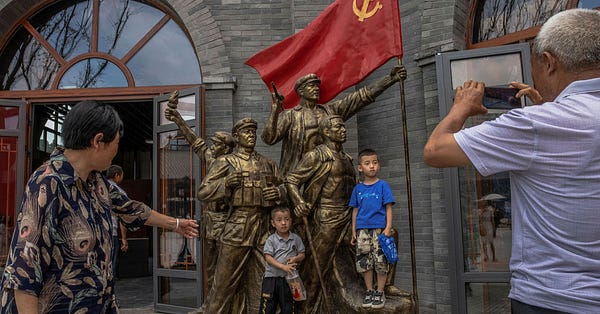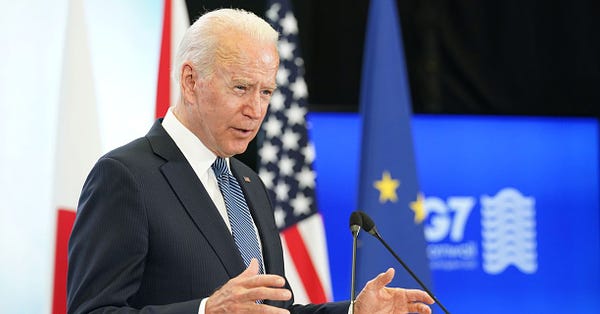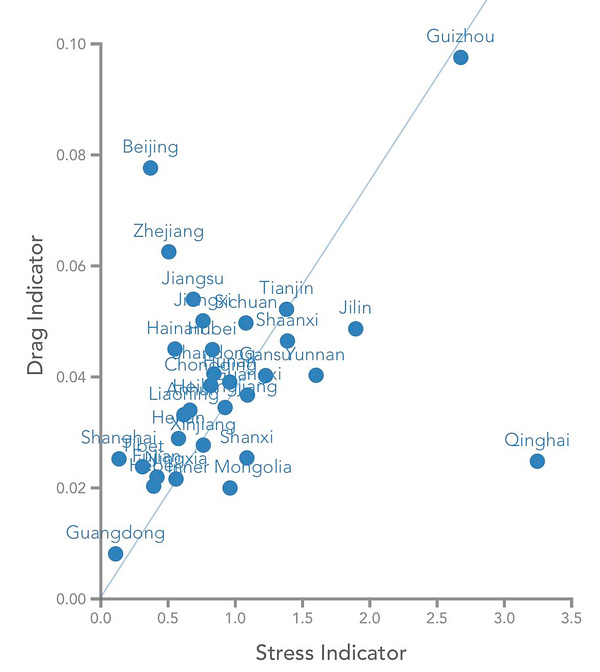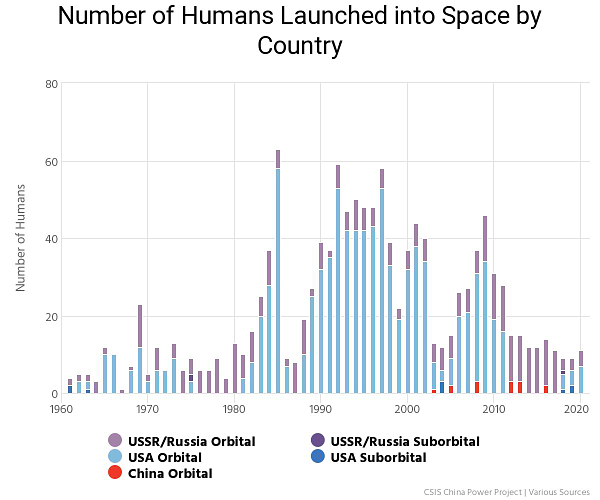Welcome to the 73rd edition of Trade War.
Hong Kong authorities raid outspoken newspaper in a startling escalation of efforts to erode the territory’s free speech. And Xi appoints trusted advisor Liu He to head massive chips development plan.
The G7 issues its most critical statement on China since the 1989 Tiananmen massacre. Meanwhile, China’s debt challenge will be exacerbated by its demographic crisis, argues a prominent analyst of the Chinese economy.
Mr. Democracy has gone to hell
A raid by police on the newsroom of outspoken newspaper Apple Daily is a startling escalation in the crackdown on free speech in Hong Kong, report New York Times reporters Austin Ramzy and Tiffany May.
“Hundreds of police officers raided the newsroom… scrutinized journalists’ computers; arrested top editors; froze company accounts; and warned readers not to repost some of its articles online,” reports the Times; the action was the “most aggressive use yet of Hong Kong’s sweeping national security law, imposed last year by Beijing, against a media outlet, and could put the newspaper’s survival in question.”
The five executives who work at Apple Daily and parent company Next Digital were arrested on suspicion of “collusion with a foreign country or with external elements to endanger national security.”
“As difficult as the current circumstances may be, we will carry on with our jobs with the aim to publish our papers as normal tomorrow,” the Next Media Trade Union said in a statement.
“A century ago, [Chinese Communist Party co-founder] Chen Duxiu said that to modernize China needed to promote both Mr. Science & Mr. Democracy,” tweeted the Time’s Li Yuan. “Today as China sent 3 astronauts into a space station and arrested 5 Apply Daily executives, online comments said that Mr. S had gone to heaven while Mr. D had gone to hell.”


“Only a tiny minority of people will be affected”
“Films will be censored, but [Hong Kong] will be a “cultural hub.” Funds frozen, but [Hong Kong] a “secure financial centre.” Editors arrested for journalism, but journalism “not affected.” My elected [Legislative Council representative] is in prison, but “only a tiny minority of people will be affected” by [the National Security Law],” one person tweeted.


19th century form of ethno-nationalist imperialism
As China prepares to celebrate the 100th anniversary of the founding of the Chinese Communist Party, Xi is pushing the country into what can be seen as its fourth distinct era, writes the Financial Times’ Jamil Anderlini.
“The first three are the revolutionary period in the 1920s, 30s and 40s, the brutal Maoist era following the establishment of the People’s Republic in 1949 and the economic and political liberalization under Deng Xiaoping and his successors,” writes Anderlini.
Xi, who has “consciously set out to define a fourth era,” is pushing for a “dramatic expansion of China’s military, a far more assertive stance globally and total suppression of dissent. Economically, he has laid out a state-dominated vision of self-reliance that one former World Bank official describes as a “wartime” economic plan.”
The CCP “has morphed into a conservative reactionary party bent on preserving the power of state capitalist elites and advancing a distinctly 19th century form of ethno-nationalist imperialism,” writes Anderlini.


Xi’s trusted advisor Liu He new chips czar
Xi Jinping is turning to a trusted advisor to head a trillion dollar national effort to boost China’s chip industry even as it faces growing U.S. sanctions, reports Bloomberg News.
“Liu He, Xi’s economic czar whose sprawling portfolio spans trade to finance and technology, has been tapped to spearhead the development of so-called third-generation chip development and capabilities and is leading the formulation of a series of financial and policy supports for the technology, according to people with knowledge of the matter,” reports the financial news agency.
China announced in its latest five year plan that a “whole nation system” would be used in the chip effort. “First introduced under Mao Zedong to help the then-fledgling Communist China industrialize, the approach was crucial to helping Beijing attain a number of top national priorities, from developing its first atomic bomb in the early 1960s to achieving Olympic sporting success. After that it was largely set aside as officials shifted to focus on economic growth.”
“For our country, technology and innovation is not just a matter of growth,” Liu told China’s top scientists in May. “It’s also a matter of survival.

G7 ‘most comprehensively critical’ remarks ever on China
The G7 has issued a statement criticizing China for its human rights violations in Xinjiang and Hong Kong, reports the Wall Street Journal.
The 25-page joint statement released last Sunday raised everything from “pandemic recovery to the global economy, tax, trade and girls’ education,” while asking China “to respect human rights and fundamental freedoms, especially in relation to Xinjiang and those rights, freedoms and high degree of autonomy for Hong Kong.”
The statement also noted that the G7 countries would consult on issues related to China’s behavior in the global economy.
“The statement may mark the most pointed remarks to China by G-7 leaders since the 1989 killing of students and other demonstrators known as the Tiananmen Square crackdown and the “most comprehensively critical” of China since the summits began in 1975, John Kirton, director of the University of Toronto’s G7 Research Group, told the Journal.


Demography makes China’s debt challenge worse
The real challenge for China’s economy will be dealing with its excessive debt reliance, writes Peking University finance professor Michael Pettis in Fortune. Demography - or in particular China’s declining working population - will make things worse.
“If China’s future GDP growth requires the same level of credit growth as it has in the past, then China’s debt-to-GDP ratio must rise to somewhere between 400% and 500%: an unprecedented level of debt, especially for a developing country,” writes Pettis.
“Adjusting for a declining working population makes the numbers even worse. As the working population declines by 0.5% to 0.6% a year, the amount of debt per worker rises by an additional 2% to 3% of GDP every year.”
“The main effect of deteriorating demographics is to reduce the amount of time China has to address its debt, thus making an adjustment all the more urgent.”


Local debt to GDP ratio up 30 ppt since 2008
Which province has built up the most destabilizing debt load? That’s relatively poor Guizhou while Guangdong is in best shape, according to Chicago-based MacroPolo’s “China Debt Hangover” digital project.
“More than a decade after the global financial crisis, China is still reeling from the debt hangover that was largely caused by the explosion of local government financing vehicles (LGFVs),” writes MacroPolo.
Local debt to GDP ratio has grown more than 30 percentage points from the crisis in 2008. But debt growth is not a problem as long as it supports productive investments and the borrower can repay it plus interest, points out MacroPolo.
“What is troubling is the fact that many LGFVs’ debt-financed investments can no longer service that debt, indicating that LGFVs have not invested wisely. In fact, returns on LGFV investment are on average below 2%, far lower than the cost of borrowing.”


Another tech executive warned to keep low profile
Chinese officials have warned a top executive to keep a low profile, reports Bloomberg News. The move against food delivery mogul Meituan’s Wang Xing came after the executive last month posted a controversial millennium-old poem to social media.
“The Tang Dynasty poem -- describing the burning of books under China’s first emperor -- was widely seen as anti-establishment and triggered a $26 billion selloff in Meituan’s shares over two days,” reports the financial news agency. “While the CEO later issued a clarification saying his post had been targeted at the short-sightedness of his own industry, some investors drew parallels to the criticisms issued by Alibaba Group Holding Ltd. founder Jack Ma against regulators last year, which triggered an unprecedented crackdown on China’s internet sector.”
“Like Alibaba previously, Meituan is grappling with a probe by the state antitrust watchdog into alleged monopolistic behavior such as merchant exclusivity, which some analysts have estimated could result in fines of over $700 million.”

Notable/In Depth
With China successfully launching a crewed space mission on June 17, here is a good report from CSIS that looks at how its space program measures up to the U.S. and Russia.


Noted China labor scholar Manfred Elfstrom discusses the parameters of China’s labor unrest and his new book in this podcast on the New Books Network.


Local officials are able to negotiate how they meet targets set by higher government agencies, argues this interesting paper by Georgetown professor Ning Leng and Fudan University’s Cai Zuo.

Conversation on The Myth of Chinese Capitalism
I enjoyed discussing “The Myth of Chinese Capitalism” and why China’s faltering steps on hukou reform are a problem for its economic future on Nation-State Dialogue - watch it here.


Long Montana summer days
Taken at 9:30 pm - Montana summer days are long.

